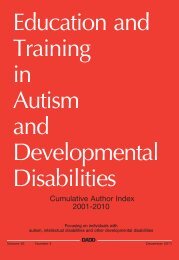Download the Journal (PDF) - Division on Autism and ...
Download the Journal (PDF) - Division on Autism and ...
Download the Journal (PDF) - Division on Autism and ...
Create successful ePaper yourself
Turn your PDF publications into a flip-book with our unique Google optimized e-Paper software.
aseline probes, data were highly variable <strong>and</strong><br />
an experimental c<strong>on</strong>trol was not achieved due<br />
to <str<strong>on</strong>g>the</str<strong>on</strong>g> lack of generalizati<strong>on</strong> data prior to <str<strong>on</strong>g>the</str<strong>on</strong>g><br />
interventi<strong>on</strong>. The low <strong>and</strong> variable generalizati<strong>on</strong><br />
achievement scores may result from <str<strong>on</strong>g>the</str<strong>on</strong>g><br />
participants’ academic skill levels. Specifically,<br />
all participants applied <str<strong>on</strong>g>the</str<strong>on</strong>g> test-taking strategy<br />
with a high level of accuracy to <str<strong>on</strong>g>the</str<strong>on</strong>g> generalizati<strong>on</strong><br />
probes, however <str<strong>on</strong>g>the</str<strong>on</strong>g>y sometimes had<br />
low overall scores because <str<strong>on</strong>g>the</str<strong>on</strong>g> c<strong>on</strong>tent knowledge<br />
was too difficult or unfamiliar, or <str<strong>on</strong>g>the</str<strong>on</strong>g> test<br />
materials were not matched to <str<strong>on</strong>g>the</str<strong>on</strong>g>ir instructi<strong>on</strong>al<br />
reading levels. It is important to note<br />
that a test-taking strategy is not intended to<br />
compensate for gaps in c<strong>on</strong>tent knowledge or<br />
reading ability. This may explain why <str<strong>on</strong>g>the</str<strong>on</strong>g> participants<br />
did not generalize <str<strong>on</strong>g>the</str<strong>on</strong>g>ir achievement<br />
outcomes to regular classroom tests, a finding<br />
inc<strong>on</strong>sistent with previous research c<strong>on</strong>ducted<br />
with students who have high incidence disabilities<br />
(Hughes & Deshler, 1993; Hughes &<br />
Schumaker, 1991; Lee & Alley, 1981). Future<br />
research is warranted to develop strategies in<br />
promoting generalizati<strong>on</strong> across types of<br />
achievement tests <strong>and</strong> to develop appropriate<br />
tests measuring general educati<strong>on</strong> c<strong>on</strong>tent<br />
with lower reading levels.<br />
Some limitati<strong>on</strong>s were noted in this study.<br />
First, a large porti<strong>on</strong> of <str<strong>on</strong>g>the</str<strong>on</strong>g> test-taking strategy<br />
training used in <str<strong>on</strong>g>the</str<strong>on</strong>g> current study relied<br />
heavily <strong>on</strong> print. Although modificati<strong>on</strong>s were<br />
made to <str<strong>on</strong>g>the</str<strong>on</strong>g> materials, <strong>and</strong> accommodati<strong>on</strong>s<br />
were given during <str<strong>on</strong>g>the</str<strong>on</strong>g> sessi<strong>on</strong>s, participants’<br />
success was still somewhat c<strong>on</strong>tingent up<strong>on</strong><br />
<str<strong>on</strong>g>the</str<strong>on</strong>g>ir reading ability. In order for <str<strong>on</strong>g>the</str<strong>on</strong>g> testtaking<br />
strategy to be most effective, <str<strong>on</strong>g>the</str<strong>on</strong>g> training<br />
materials should be matched to <str<strong>on</strong>g>the</str<strong>on</strong>g> participants’<br />
instructi<strong>on</strong>al reading level. The<br />
materials developed by Deshler <strong>and</strong> colleagues<br />
(1993) were intended to be used with<br />
adolescents with LD, thus <str<strong>on</strong>g>the</str<strong>on</strong>g> reading levels<br />
were too difficult for elementary students with<br />
mild mental disabilities. Because <str<strong>on</strong>g>the</str<strong>on</strong>g> participants<br />
benefited from <str<strong>on</strong>g>the</str<strong>on</strong>g> c<strong>on</strong>tent of <str<strong>on</strong>g>the</str<strong>on</strong>g> strategy,<br />
it would be beneficial for <str<strong>on</strong>g>the</str<strong>on</strong>g> reading<br />
level of <str<strong>on</strong>g>the</str<strong>on</strong>g> training materials to be modified<br />
for elementary students. Future research<br />
should include using <str<strong>on</strong>g>the</str<strong>on</strong>g> same procedures,<br />
but with lower level readability. Sec<strong>on</strong>d, generalizati<strong>on</strong><br />
data were <strong>on</strong>ly available post interventi<strong>on</strong><br />
<strong>and</strong> were not measured during baseline<br />
or training, making it difficult to evaluate<br />
<str<strong>on</strong>g>the</str<strong>on</strong>g> extent to which <str<strong>on</strong>g>the</str<strong>on</strong>g> participants general-<br />
ized positive achievement outcomes to regular<br />
classroom tests. Future research is needed to<br />
more systematically collect <strong>and</strong> evaluate generalizati<strong>on</strong><br />
data throughout <str<strong>on</strong>g>the</str<strong>on</strong>g> course of <str<strong>on</strong>g>the</str<strong>on</strong>g><br />
study. Finally, during <str<strong>on</strong>g>the</str<strong>on</strong>g> course of <str<strong>on</strong>g>the</str<strong>on</strong>g> study,<br />
Amy changed eligibility categories from Educable<br />
Mentally Disabled to O<str<strong>on</strong>g>the</str<strong>on</strong>g>r Health Impaired.<br />
Although her IQ score was still in <str<strong>on</strong>g>the</str<strong>on</strong>g><br />
borderline range, it is possible that she performed<br />
better than o<str<strong>on</strong>g>the</str<strong>on</strong>g>r participants due to a<br />
higher cognitive ability level, making her results<br />
difficult to compare to those of students<br />
with EMD.<br />
Despite <str<strong>on</strong>g>the</str<strong>on</strong>g> limitati<strong>on</strong>s, this study offers important<br />
research <strong>and</strong> practice implicati<strong>on</strong>s.<br />
The No Child Left Behind Act of 2001 <strong>and</strong> <str<strong>on</strong>g>the</str<strong>on</strong>g><br />
Individuals with Disabilities Educati<strong>on</strong> Improvement<br />
Act (2004) state that students with<br />
mild mental disabilities must be exposed to<br />
<strong>and</strong> assessed <strong>on</strong> general curriculum grade appropriate<br />
st<strong>and</strong>ards. States most often assess<br />
students’ achievement through <str<strong>on</strong>g>the</str<strong>on</strong>g> use of<br />
st<strong>and</strong>ardized tests, thus it is critical that students<br />
with mild mental disabilities c<strong>on</strong>tinue to<br />
be taught direct <strong>and</strong> explicit test-taking strategies.<br />
This study dem<strong>on</strong>strates that students<br />
who are identified as having mild mental disabilities<br />
can be taught effectively a comprehensive<br />
test-taking strategy which may c<strong>on</strong>sequently<br />
improve achievement. Teachers <strong>and</strong><br />
educators working with students with mild<br />
mental disabilities may utilize test-taking strategy<br />
instructi<strong>on</strong> as a promising <strong>and</strong> valid<br />
method for improving students’ test-taking<br />
skills <strong>and</strong> academic achievement. In additi<strong>on</strong>,<br />
this study points to <str<strong>on</strong>g>the</str<strong>on</strong>g> need for modificati<strong>on</strong>s<br />
in teaching students with mild mental disabilities<br />
who have lower academic skills <strong>and</strong> more<br />
reading delays. Participants in this study received<br />
instructi<strong>on</strong> in a <strong>on</strong>e-<strong>on</strong>-<strong>on</strong>e setting,<br />
with direct instructi<strong>on</strong>, verbal rehearsal, cue<br />
cards <strong>and</strong> fading prompts used as instructi<strong>on</strong>al<br />
methods to teach <str<strong>on</strong>g>the</str<strong>on</strong>g> test-taking strategy.<br />
Complex wording in <str<strong>on</strong>g>the</str<strong>on</strong>g> training materials<br />
was simplified or read aloud to students. If<br />
students with mild mental disabilities are to be<br />
held accountable through high stakes, st<strong>and</strong>ardized<br />
achievement testing, appropriate<br />
modificati<strong>on</strong>s must be made to allow <str<strong>on</strong>g>the</str<strong>on</strong>g>se<br />
students to fully dem<strong>on</strong>strate <str<strong>on</strong>g>the</str<strong>on</strong>g>ir competence.<br />
Similarly, it is vital that appropriate<br />
training <strong>and</strong> test materials are developed so<br />
that <str<strong>on</strong>g>the</str<strong>on</strong>g>y match to students’ instructi<strong>on</strong>al<br />
Teaching Test-taking Strategies / 407
















